Intro
Identify 7 dehydration symptoms, including dry mouth, fatigue, and dizziness. Learn to recognize early signs of dehydration, heat exhaustion, and fluid imbalance to stay hydrated and healthy.
Dehydration is a common and potentially life-threatening condition that occurs when the body loses more fluids than it takes in. This can happen for a variety of reasons, including excessive sweating, vomiting, diarrhea, and not drinking enough water. Dehydration can affect anyone, regardless of age or health status, and it's essential to recognize the symptoms to take prompt action. In this article, we'll delve into the importance of understanding dehydration symptoms, exploring the various signs and indicators that signal the body's need for hydration.
Recognizing dehydration symptoms is crucial because it allows individuals to take corrective measures before the condition worsens. Mild dehydration can often be treated by simply drinking more fluids, but severe dehydration requires medical attention. The consequences of ignoring dehydration symptoms can be severe, ranging from heat stroke and kidney damage to even death in extreme cases. Therefore, it's vital to educate oneself on the warning signs of dehydration to ensure timely intervention.
The human body is composed of approximately 60% water, which plays a critical role in maintaining bodily functions, such as regulating temperature, transporting nutrients, and removing waste products. When the body loses fluids, it disrupts this delicate balance, leading to a range of symptoms that can be mild, moderate, or severe. Understanding these symptoms is the first step in preventing dehydration and ensuring overall health and well-being.
Introduction to Dehydration Symptoms
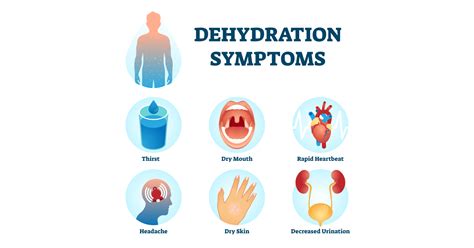
Dehydration symptoms can vary depending on the severity of the condition, the age of the individual, and the underlying cause. Some people may experience mild symptoms, such as dry mouth and fatigue, while others may exhibit more severe signs, such as seizures and coma. It's essential to be aware of these symptoms to provide appropriate care and seek medical attention when necessary.
Common Dehydration Symptoms
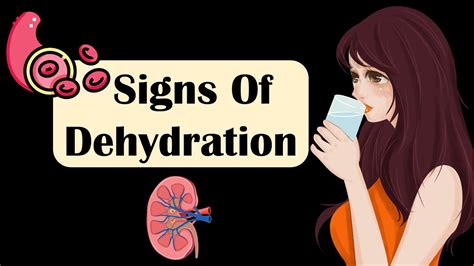
The most common dehydration symptoms include:
- Dry mouth and throat
- Fatigue and weakness
- Headaches
- Dizziness and lightheadedness
- Dark urine and decreased urine output
- Sunken eyes and decreased tear production
- Rapid heartbeat and low blood pressure
These symptoms can be mild, moderate, or severe, depending on the extent of fluid loss. It's crucial to monitor these symptoms and seek medical attention if they worsen or if the individual experiences severe symptoms, such as difficulty breathing, chest pain, or seizures.
Mild Dehydration Symptoms
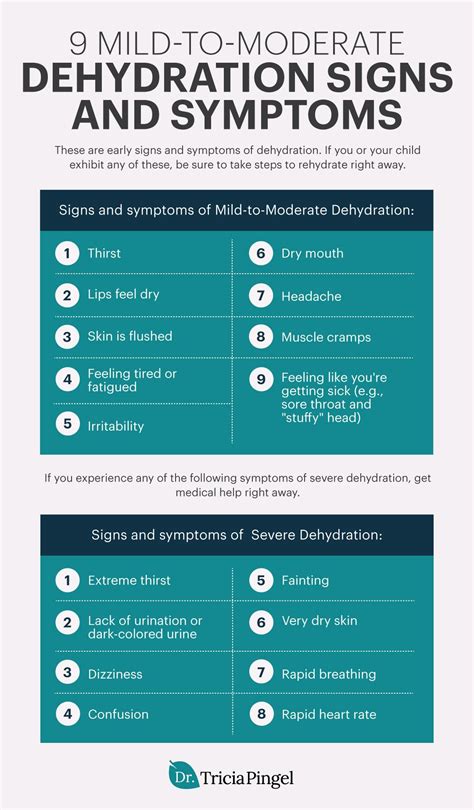
Mild dehydration symptoms are often overlooked, but they can be a sign of a more serious underlying condition. These symptoms include:
- Thirst and dry mouth
- Fatigue and weakness
- Headaches
- Dizziness and lightheadedness
- Mild nausea and vomiting
If left untreated, mild dehydration can progress to moderate or severe dehydration, which can have serious consequences. It's essential to drink plenty of fluids and rest to help the body recover from mild dehydration.
Moderate Dehydration Symptoms
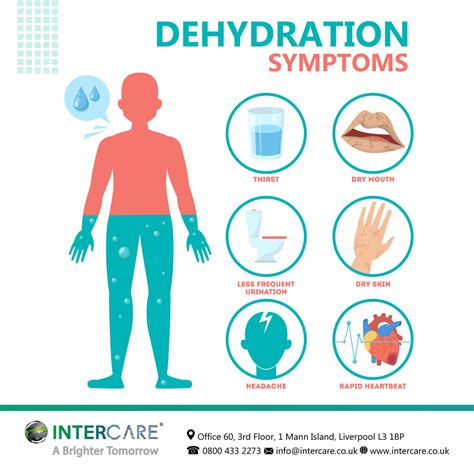
Moderate dehydration symptoms are more severe than mild symptoms and require prompt attention. These symptoms include:
- Decreased urine output and dark urine
- Sunken eyes and decreased tear production
- Rapid heartbeat and low blood pressure
- Muscle cramps and weakness
- Nausea and vomiting
If an individual experiences moderate dehydration symptoms, it's essential to seek medical attention to prevent the condition from worsening. A healthcare professional can provide guidance on treatment and help the individual recover from dehydration.
Severe Dehydration Symptoms
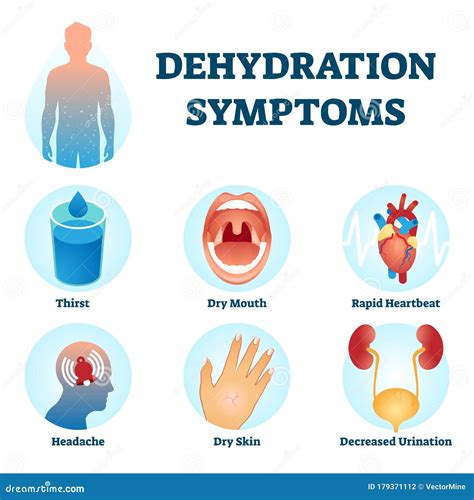
Severe dehydration symptoms are life-threatening and require immediate medical attention. These symptoms include:
- Difficulty breathing
- Chest pain and rapid heartbeat
- Seizures and coma
- Low blood pressure and decreased circulation
- Organ failure and shock
If an individual experiences severe dehydration symptoms, it's crucial to call emergency services or seek immediate medical attention. Prompt treatment can help prevent long-term damage and save lives.
Dehydration Symptoms in Children and Infants

Dehydration symptoms in children and infants can be different from those experienced by adults. Some common symptoms include:
- Dry mouth and throat
- Fewer wet diapers
- Sunken eyes and decreased tear production
- Irritability and restlessness
- Lack of energy and playfulness
It's essential to monitor these symptoms and seek medical attention if they worsen or if the child experiences severe symptoms, such as difficulty breathing, seizures, or coma.
Dehydration Symptoms in Older Adults
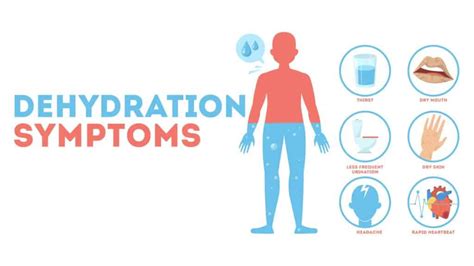
Dehydration symptoms in older adults can be more severe due to age-related changes and underlying medical conditions. Some common symptoms include:
- Confusion and disorientation
- Dizziness and lightheadedness
- Fatigue and weakness
- Headaches and muscle cramps
- Decreased urine output and dark urine
It's essential to monitor these symptoms and seek medical attention if they worsen or if the individual experiences severe symptoms, such as difficulty breathing, chest pain, or seizures.
Preventing Dehydration
Preventing dehydration is crucial to maintaining overall health and well-being. Some tips to prevent dehydration include: * Drinking plenty of fluids, such as water and electrolyte-rich beverages * Avoiding excessive sweating and heat exposure * Eating foods rich in water content, such as fruits and vegetables * Avoiding caffeinated and carbonated beverages * Monitoring urine output and colorBy following these tips, individuals can reduce their risk of dehydration and maintain optimal health.
Treating Dehydration
Treating dehydration depends on the severity of the condition and the underlying cause. Some common treatments include: * Drinking plenty of fluids, such as water and electrolyte-rich beverages * Resting and avoiding strenuous activities * Using oral rehydration solutions, such as Pedialyte * Seeking medical attention if symptoms worsen or if the individual experiences severe symptomsIt's essential to seek medical attention if dehydration symptoms persist or worsen over time. A healthcare professional can provide guidance on treatment and help the individual recover from dehydration.
What are the common causes of dehydration?
+Common causes of dehydration include excessive sweating, vomiting, diarrhea, and not drinking enough water.
How can I prevent dehydration?
+Preventing dehydration can be achieved by drinking plenty of fluids, avoiding excessive sweating and heat exposure, eating foods rich in water content, and avoiding caffeinated and carbonated beverages.
What are the symptoms of severe dehydration?
+Symptoms of severe dehydration include difficulty breathing, chest pain, seizures, coma, low blood pressure, and decreased circulation.
How can I treat mild dehydration?
+Treating mild dehydration can be achieved by drinking plenty of fluids, resting, and avoiding strenuous activities.
When should I seek medical attention for dehydration?
+Seeking medical attention is essential if dehydration symptoms persist or worsen over time, or if the individual experiences severe symptoms, such as difficulty breathing, chest pain, or seizures.
In conclusion, recognizing dehydration symptoms is crucial to maintaining overall health and well-being. By understanding the common causes, symptoms, and treatments of dehydration, individuals can take prompt action to prevent and treat this condition. We encourage readers to share their experiences and tips on preventing dehydration in the comments below. If you found this article informative, please share it with your friends and family to help spread awareness about the importance of hydration. Remember, staying hydrated is essential to maintaining optimal health, and by working together, we can prevent dehydration and promote overall well-being.
